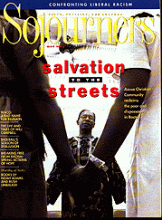We are a people on a journey from the season of betrayal and crucifixion to the season of resurrection and Pentecost -- a time for receiving the Spirit that will revive, renew, and empower.
For me this is a breathing time -- a time for tapping into the open and free space of God's Spirit, where our despair is released into speech, our brokenness healed, our betrayals forgiven, and where there is deep movement from fear and denial toward a new vision of community.
The movement of the Spirit is never private, yet always personal. The power of God's Spirit touches our hearts and longs to be engaged with our bodies and voices in public witness. As you use this lectionary, I suggest the following:
· Center yourself in prayer -- "Let thy Spirit breathe through me."
· Engage in a time of meditation and reflection using the study questions.
· Engage in a time of action that flows out of your meditation.
May 2: Follow Christ's Footsteps
1 Peter 2:19-25, Acts 2:42-47, John 10:1-10, Psalm 23
The Holy Spirit confronts every person with a choice: Choose death or choose life; choose continuing oppression or choose liberation; choose selfishness or choose sacrifice. In the Acts 2:42-47 passage, the followers of Jesus Christ choose life.
In the face of unspoken threat, they refuse to be confined, rendered timid, or silent. They opt for a life of community and risk, marked by street presence, jail, preaching in court to the authorities, prayer and table gatherings and support, and then back to the streets. The new believers formed support groups where they could learn God's Word, pray, and mature in the faith. They broke bread together and shared all things in common so that all could benefit from God's gifts.
Read the Full Article

